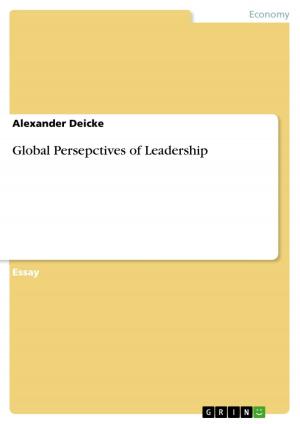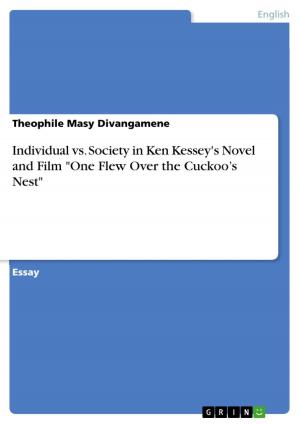Volkswagen AG - The German Car Manufacturer and its Road to Internationalization
A Focus on the Chinese Market
Business & Finance, Management & Leadership, Operations Research| Author: | Matthias Boeing | ISBN: | 9783656374510 |
| Publisher: | GRIN Publishing | Publication: | February 19, 2013 |
| Imprint: | GRIN Publishing | Language: | English |
| Author: | Matthias Boeing |
| ISBN: | 9783656374510 |
| Publisher: | GRIN Publishing |
| Publication: | February 19, 2013 |
| Imprint: | GRIN Publishing |
| Language: | English |
Seminar paper from the year 2013 in the subject Business economics - Operations Research, grade: 1.0 (Distinction) , The University of York (The York Management School), course: International Business and Strategic Management, language: English, abstract: During the last decades the rapidly increasing pace of globalization created opportunities as well as challenges for many corporations all over the world. Among other industries, this process has also heavily affected car manufactures. From a first idea about a 'Volkswagen' in 1904, the Volkswagen Group has grown to one of the largest and most successful car manufacturers worldwide ranked 17th among the world's biggest corporations by Forbes. Fuelled by the economic rebuilding of Europe as well as the attempts of several third world countries to gain economic influence, Volkswagen started its road to internationalization around 1950 to 1960 resulting in a breakthrough in Europe, the United States as well as Africa. Continuing this process Volkswagen later discovered the Chinese market in the 1980s. On the one hand this internationalization was favoured by opportunities but on the other hand different countries come along with issues that are unlike of those in their home market in Germany. This essay investigates which main opportunities and challenges VW particularly faced in the Chinese market starting from the beginning of its operations in 1985 to the early 21st century using an institution - based view. It also critically analyses the applicability of Dunning's OLI paradigm for Volkswagen's internationalization strategy in China.
Matthias Boeing, M.Sc., born in 1990 in Dorsten holds a Bachelor of Arts in International Management from the FOM University of Applied Sciences in Essen and a Masters of Science in International Business and Strategic Management from the University of York. The author also studied one semester at Boston University in the USA, where he acquired knowledge about cultural differences in academic courses as well as through direct interaction with various different cultures. This aspect also contributes to his interest in different cultures and their effects on business topics. Apart from his academic experience Mr. Boeing has gained work experience through different roles at E.ON Ruhrgas AG in Germany, in the consulting department of the German American Chamber of Commerce in New York City and as Management Consultant at PwC in Germany. He is currently employed at Daimler AG, the parent company of Mercedes-Benz, trying to define the impact of Digitalization on Finance.
Seminar paper from the year 2013 in the subject Business economics - Operations Research, grade: 1.0 (Distinction) , The University of York (The York Management School), course: International Business and Strategic Management, language: English, abstract: During the last decades the rapidly increasing pace of globalization created opportunities as well as challenges for many corporations all over the world. Among other industries, this process has also heavily affected car manufactures. From a first idea about a 'Volkswagen' in 1904, the Volkswagen Group has grown to one of the largest and most successful car manufacturers worldwide ranked 17th among the world's biggest corporations by Forbes. Fuelled by the economic rebuilding of Europe as well as the attempts of several third world countries to gain economic influence, Volkswagen started its road to internationalization around 1950 to 1960 resulting in a breakthrough in Europe, the United States as well as Africa. Continuing this process Volkswagen later discovered the Chinese market in the 1980s. On the one hand this internationalization was favoured by opportunities but on the other hand different countries come along with issues that are unlike of those in their home market in Germany. This essay investigates which main opportunities and challenges VW particularly faced in the Chinese market starting from the beginning of its operations in 1985 to the early 21st century using an institution - based view. It also critically analyses the applicability of Dunning's OLI paradigm for Volkswagen's internationalization strategy in China.
Matthias Boeing, M.Sc., born in 1990 in Dorsten holds a Bachelor of Arts in International Management from the FOM University of Applied Sciences in Essen and a Masters of Science in International Business and Strategic Management from the University of York. The author also studied one semester at Boston University in the USA, where he acquired knowledge about cultural differences in academic courses as well as through direct interaction with various different cultures. This aspect also contributes to his interest in different cultures and their effects on business topics. Apart from his academic experience Mr. Boeing has gained work experience through different roles at E.ON Ruhrgas AG in Germany, in the consulting department of the German American Chamber of Commerce in New York City and as Management Consultant at PwC in Germany. He is currently employed at Daimler AG, the parent company of Mercedes-Benz, trying to define the impact of Digitalization on Finance.















